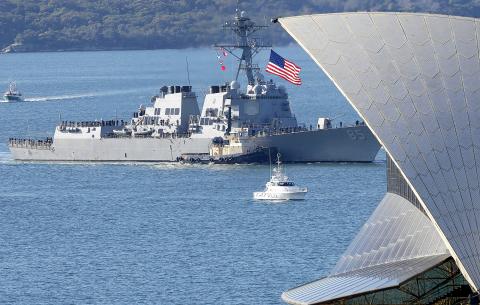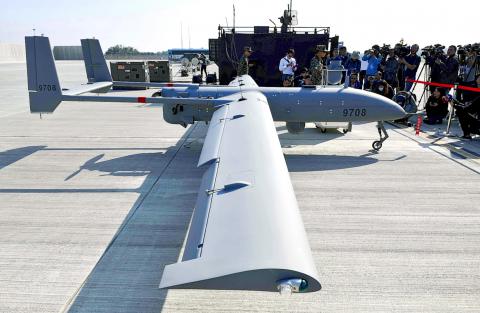The US Navy yesterday sailed two warships, the Arleigh Burke-class destroyer USS McCampbell and fleet replenishment oiler the USNS Walter S. Diehl, through the Taiwan Strait, official sources said.
The ships “conducted a routine Taiwan Strait transit” which is “in accordance with international law,” US Pacific Fleet spokesman Lieutenant Commander Tim Gorman told CNN.
The US Navy had sailed warships through the Taiwan Strait in October and November last year, marking a notable increase in the frequency of such operations that were previously conducted about once a year, CNN said.

Photo: AP
The US Defense Intelligence Agency earlier this month issued a report saying that China has undertaken military reforms and obtained technologies because of “Beijing’s longstanding interest to eventually compel Taiwan’s reunification with the mainland and deter any attempt by Taiwan to declare independence,” according to CNN.
US Chief of Naval Operations Admiral John Richardson said he told Chinese officials during a meeting last month that US policy toward Taiwan remains unchanged, and that Washington is “opposed to any kind of unilateral action from either side of the Strait that would change that status quo.”
In other news, the Taiwanese navy yesterday showed off its latest long-range surveillance drone as the nation’s outgunned armed forces push to counter China’s increasingly muscular rhetoric and military exercises.

Photo: Sam Yeh/AFP
The military has hosted multiple drills since Chinese President Xi Jinping’s (習近平) major speech about Taiwan on Jan. 2, emphasizing what it says is a readiness to counter any invasion.
The navy showed off its new, long-range surveillance drone, the Rui Yuan (銳鳶, Sharp Hawk), which officials said can fly for 12 hours and is helping to monitor movements in the Taiwan Strait.
“The drones are now an irreplaceable part of our reconnaissance strategy,” Ministry of National Defense spokesman Major General Chen Chung-chi (陳中吉) said.
“They are our primary option for activities in the Strait,” he said.
“The use of more locally made drones demonstrates Taiwan’s defense self-sufficiency and helps boost its reconnaissance capabilities,” said Wang Kao-cheng (王高成), a military analyst at Tamkang University.
The nation’s US-made F-16 and aging French-made Mirage jets are being increasingly called upon to respond to military movements from China, with some analysts warning that the fleet is getting worn down and lacking crucial spare parts.
Lin Ming-chang, an executive officer with the navy, said that drones were particularly cost-effective for surveillance.
“A pilot, when he flies, has to come back in two hours, but not the Rui Yuan drone. We can stay up in the air for up to 12 hours,” he said.
“In operating terms, both when it comes to fuel or machine parts, the drone can operate way longer than manned aircraft,” he added.
The navy yesterday also unveiled a hand-launched surveillance drone called “The Cardinal,” which it said can stay airborne for an hour.
In related news, the ministry yesterday said that it had observed and monitored the passage of People’s Liberation Army Air Force (PLAAF) planes to and from aircraft exercises in the west Pacific.
According to the ministry’s report yesterday afternoon, PLAAF planes — including the Shaanxi KJ-500 early-warning aircraft and Xian H-6 bombers — took off from airbases in southern China and passed the Bashi Channel on their way to the west Pacific.
The ministry said the planes took the same route back.
The air force and navy were dispatched to monitor the Chinese planes and ensure that they did not stray into Taiwanese air space, the ministry said.
The report is the second time this week that it observed Chinese planes conducting exercises.
On Tuesday, it observed Y-8 transports and Su-30 jets flying to the west Pacific through the Bashi Channel before returning to air bases in southern China via the same route.

US President Donald Trump yesterday announced sweeping "reciprocal tariffs" on US trading partners, including a 32 percent tax on goods from Taiwan that is set to take effect on Wednesday. At a Rose Garden event, Trump declared a 10 percent baseline tax on imports from all countries, with the White House saying it would take effect on Saturday. Countries with larger trade surpluses with the US would face higher duties beginning on Wednesday, including Taiwan (32 percent), China (34 percent), Japan (24 percent), South Korea (25 percent), Vietnam (46 percent) and Thailand (36 percent). Canada and Mexico, the two largest US trading

AIR SUPPORT: The Ministry of National Defense thanked the US for the delivery, adding that it was an indicator of the White House’s commitment to the Taiwan Relations Act Deputy Minister of National Defense Po Horng-huei (柏鴻輝) and Representative to the US Alexander Yui on Friday attended a delivery ceremony for the first of Taiwan’s long-awaited 66 F-16C/D Block 70 jets at a Lockheed Martin Corp factory in Greenville, South Carolina. “We are so proud to be the global home of the F-16 and to support Taiwan’s air defense capabilities,” US Representative William Timmons wrote on X, alongside a photograph of Taiwanese and US officials at the event. The F-16C/D Block 70 jets Taiwan ordered have the same capabilities as aircraft that had been upgraded to F-16Vs. The batch of Lockheed Martin

GRIDLOCK: The National Fire Agency’s Special Search and Rescue team is on standby to travel to the countries to help out with the rescue effort A powerful earthquake rocked Myanmar and neighboring Thailand yesterday, killing at least three people in Bangkok and burying dozens when a high-rise building under construction collapsed. Footage shared on social media from Myanmar’s second-largest city showed widespread destruction, raising fears that many were trapped under the rubble or killed. The magnitude 7.7 earthquake, with an epicenter near Mandalay in Myanmar, struck at midday and was followed by a strong magnitude 6.4 aftershock. The extent of death, injury and destruction — especially in Myanmar, which is embroiled in a civil war and where information is tightly controlled at the best of times —

China's military today said it began joint army, navy and rocket force exercises around Taiwan to "serve as a stern warning and powerful deterrent against Taiwanese independence," calling President William Lai (賴清德) a "parasite." The exercises come after Lai called Beijing a "foreign hostile force" last month. More than 10 Chinese military ships approached close to Taiwan's 24 nautical mile (44.4km) contiguous zone this morning and Taiwan sent its own warships to respond, two senior Taiwanese officials said. Taiwan has not yet detected any live fire by the Chinese military so far, one of the officials said. The drills took place after US Secretary